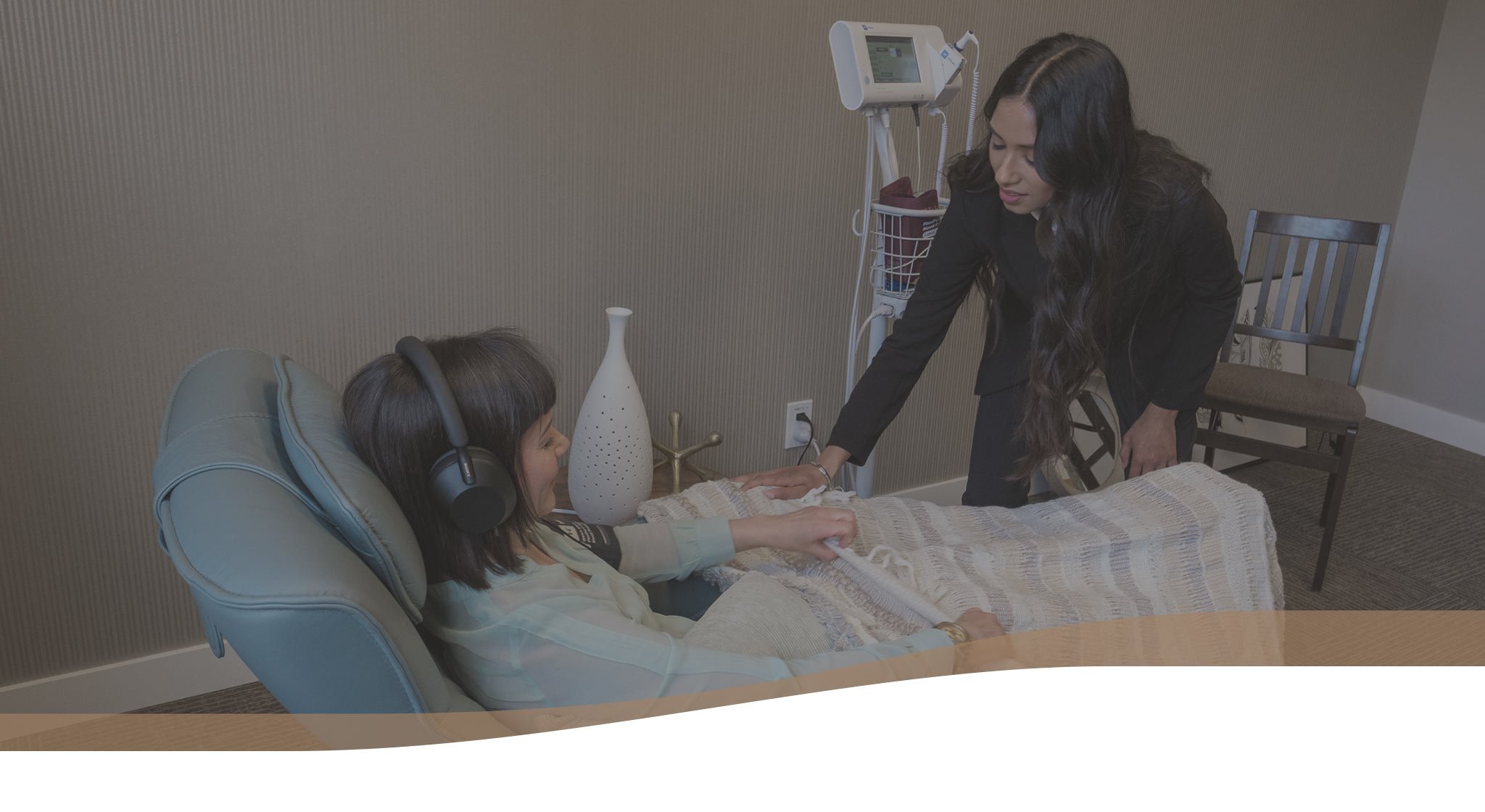
Ketamine Therapy
To help alleviate major depression, anxiety, chronic pain, substance abuse and psychiatric disorders.
What is Ketamine Therapy?
Ketamine is a revolutionary treatment with incredible promise in treating depression, anxiety, chronic pain, and substance abuse disorders.
Unlike traditional antidepressants, which can take weeks or even months to work, ketamine can bring relief in a matter of hours or days. This rapid onset of action has made it a game-changer in treating treatment-resistant depression (TRD) and other difficult-to-treat conditions.
The Key Benefits of Ketamine Therapy
Ketamine therapy is a medical treatment that offers several important benefits for people struggling with certain mental health conditions and chronic pain. One of the main advantages of this therapy is its fast-acting relief, which means that it can help reduce symptoms quickly, often within hours or days, rather than weeks or months like other treatments. Additionally, ketamine is effective in cases where other medications have failed, providing hope for those who haven't found relief through traditional methods. This treatment is also generally safe and well-tolerated, with few side effects compared to other medications. Ketamine therapy is an innovative and promising option for people seeking help with their mental health or chronic pain.
Ketamine therapy can have a transformative impact.
Ketamine therapy, in conjunction with other available therapies at Envision Mind Care, has shown efficacy in addressing certain treatment-resistant disorders, anxiety, chronic pain and mood disorders.
Learn how ketamine works.
Improved Mood and Reduction of Suicidal Ideation
In clinical studies, ketamine has been shown to improve mood and reduce suicidal thoughts in over 70% of Treatment Resistant Depression patients, with noticeable results seen within 24-48 hours.
Reduce Anxiety Symptoms with a Single Dose
Research has found that a single dose of ketamine can reduce Anxiety symptoms by up to 50%, with effects lasting for several days.
Significant Reduction of Chronic Pain
Ketamine infusions have been shown to significantly reduce Chronic Pain by 30-50% in patients with various conditions, with relief lasting for up to two weeks after a single infusion.
Long-term results for substance abuse disorders
Ketamine-assisted therapy has successfully reduced Substance Abuse Disorder, with some studies reporting abstinence rates of up to 60% and decreased cravings by 70%.

Ketamine Therapy has proven efficacy
Ketamine therapy has demonstrated remarkable efficacy in clinical settings, providing relief for various mental health conditions and chronic pain. In a study published in the American Journal of Psychiatry, researchers found that a single intravenous dose of ketamine rapidly reduced depressive symptoms within 24 hours in patients with treatment-resistant depression (aan het Rot, Collins, & Murrough, 2010). Another study published in JAMA Psychiatry showed that ketamine infusions significantly reduced suicidal ideation in patients experiencing severe depression (Grunebaum et al., 2018). Additionally, a review of clinical trials in the journal Biological Psychiatry highlighted the potential of ketamine therapy for treating post-traumatic stress disorder (PTSD), revealing that ketamine infusions led to rapid symptom reduction in patients with PTSD (Feder et al., 2014). In terms of chronic pain management, a study in the journal Anesthesiology demonstrated that low-dose ketamine infusions could provide effective pain relief for patients with complex regional pain syndrome (Schwartzman et al., 2009). These studies and others underscore the proven efficacy of ketamine therapy in clinical settings, offering hope for individuals struggling with mental health conditions and chronic pain that have been unresponsive to traditional treatments.
References:
Aan het Rot, M., Collins, K. A., & Murrough, J. W. (2010). Safety and efficacy of repeated-dose intravenous ketamine for treatment-resistant depression. American Journal of Psychiatry, 167(2), 156-164.
Feder, A., Parides, M. K., Murrough, J. W., Perez, A. M., Morgan, J. E ., Saxena, S., ... & Charney, D. S. (2014). Efficacy of intravenous ketamine for treatment of chronic posttraumatic stress disorder: a randomized clinical trial. JAMA Psychiatry, 71(6), 681-688.
Grunebaum, M. F., Galfalvy, H. C., Choo, T. H., Keilp, J. G., Moitra, V. K., Parris, M. S., ... & Mann, J. J. (2018). Ketamine for rapid reduction of suicidal thoughts in major depression: a midazolam-controlled randomized clinical trial. JAMA Psychiatry, 75(2), 139-148.
Schwartzman, R. J., Alexander, G. M., Grothusen, J. R., Paylor, T., Reichenberger, E., & Perreault, M. (2009). Outpatient intravenous ketamine for the treatment of complex regional pain syndrome: a double-blind placebo-controlled study. Anesthesiology, 110(6), 1279-1287.

Evidence-based therapy in a comfortable setting
Envision Mind Care provides a comprehensive mental health environment for you to rest and heal.
Visit our clinic
Clients visit from across Canada and throughout the globe to get the complete care provided by Envision Mind Care & Research Institute.
Intramuscular (IM) Ketamine Treatment for Depression
Intramuscular (IM) ketamine treatment is an option for adults (>18 years) with treatment-resistant depression who have not responded to trials of two or more antidepressants. It is believed to work by promoting the growth of dendrites and synapses through the release of brain-derived neurotrophic factor (BDNF), which supports the survival of existing neurons.
Consultation
Your first appointment is a consultation with a psychiatrist. They will assess your mental and physical health history and answer any questions you have. The psychiatrist will determine if you are an appropriate candidate for IM ketamine therapy.
Screening Consult
We require an initial screening consult to ensure that IM ketamine is appropriate for your case. This is normally done at our office, but if you have a long distance to travel, this can be a video consult. For video consults, we’ll need your email address, and you’ll need access to a device or computer with a camera. At your appointment time, simply follow the link in your email, and click on the button that says “join on the web instead”. There is no need to install software on your device.
Intra muscular Ketamine
When you arrive for your IM ketamine , a nurse will bring you to a private treatment room. The nurse will administer the medication by injection into a muscle, and will monitor your vital signs including blood pressure, heart rate, and oxygen saturation. The dose of ketamine will be tailored to you by the psychiatrist.
Comfort
Our treatment rooms have blankets, pillows and dimmable lighting for your comfort. You can bring your own mobile device to listen to music with earbuds or use our headphones. Family members or friends are welcome to stay with you during the treatment.
Course of Treatment
The initial course is for 4 weeks. Our clinic recommends two injections per week for four weeks for a total of eight treatments. Required maintenance treatments vary by nature of illness and its severity. Our Psychiatrist Dr Ganapathy will guide you on the same.
What to Expect during the session
A sense of calmness, a deeply felt positive mood, a transcendence of space and time, feeling detached - can happen during ketamine session. However, ketamine’s effect is highly personal and depends on a person’s mindset and the setting of their experience.
Side Effects
The most common side effect of Ketamine is dissociation, which is when clients feel detached from their own body. Dissociation affects up to a third of people during the first injection, and decreases with each subsequent injection. Other common side effects include headache, nausea, dizziness, blurred vision, drowsiness, anxiety, and elevated blood pressure and heart rate. All side effects are transient and resolve quickly post-injection.
Risks
Any time a medication is administered via injection, there are risks such as discomfort from the needle stick, bruising, and infection at the injection site. We can consider doing Intranasal treatment or Lozenges if you prefer. Additionally, there is a small risk that ketamine may not help your depression in which case we will suggest alternative options.
Aftercare:
For the remainder of the day after each injection, you must not drive a car, operate hazardous equipment, or engage in hazardous activities. Plan to not conduct business or make any critical decisions. You must refrain from consuming alcohol or other recreational drugs for 24 hours before and 24 hours after an injection. You must inform the medical center of all prescription medications and over-the-counter supplements you are taking.
Ketamine Therapy Team
-

Mary-Anne (Marnie) MacKay PhD, RN
Mental Health Nurse
-

Dr. Karthikeyan Ganapathy
Consultant Psychiatrist
-

Harjyot Singh
Ketamine Therapist
FAQ and Additional Questions
-
The duration of clinical Ketamine treatment can vary depending on the condition being treated and the individual patient's response to the medication. However, the typical treatment course for depression and anxiety disorders usually involves 2 sessions per week for four weeks .
-
After a Ketamine treatment, it is recommended to rest for several hours before resuming normal activities. This is to ensure that you have fully recovered from the effects of the medication before engaging in any activities that require coordination or mental focus.
-
Absolutely. We will always assess you for suitability for Ketamine.
-
The likelihood of a positive response to Ketamine treatment for major depressive disorder varies from patient to patient, but research has shown that it can be effective in up to 70% of cases. However, it is important to note that the response may not be long-lasting and additional treatments may be necessary.
-
Patients are usually allowed to continue taking their medications during Ketamine treatment, but it is important to inform the treating physician of all medications being taken to avoid any potential drug interactions.
-
If you have a history of substance use and actively using it, history of psychotic disorders, or uncontrolled hypertension. Pregnant women and individuals with certain medical conditions such as liver or kidney disease may also not be eligible for treatment. It is important to consult with a qualified medical professional to determine eligibility for Ketamine therapy.


